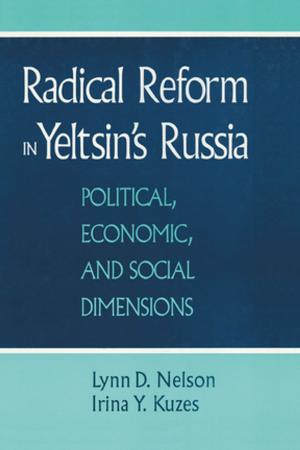National Currencies and Globalization
Endangered Specie?
Nonfiction, Social & Cultural Studies, Political Science| Author: | Paul Bowles | ISBN: | 9781135976026 |
| Publisher: | Taylor and Francis | Publication: | December 11, 2007 |
| Imprint: | Routledge | Language: | English |
| Author: | Paul Bowles |
| ISBN: | 9781135976026 |
| Publisher: | Taylor and Francis |
| Publication: | December 11, 2007 |
| Imprint: | Routledge |
| Language: | English |
Globalization and money – two concepts inextricably linked. In many ways the speed with which financial resources traverse the globe, the opportunities which this provides for the efficient allocation of resources, the possibilities which this creates for financial crises and traders who act as agents removed from the concerns of national citizens have come to symbolize the phenomenon, hopes and fears of ‘globalization’.
However, inextricably linked they may be, but well understood they are not. In the case of national currencies, a wide variety of predictions and analyses can be found. For some, national currencies represent barriers to a seamless global economy. Others argue that national currencies will disappear due to the power of international financial markets which will force national governments to adopt more credible currencies and abandon their own. In contrast, others see imperialism or regionalism as the main challenges.
Paul Bowles provides an innovative and systematic analysis of the implications of theories of globalization for national currencies. He critically examines whether, as a result, the world is heading for fewer currencies. He argues that the main ‘force of globalization’ which is endangering national currencies is that of globalization as ‘neoliberal globalism’. However there is no single neoliberal position on money and so the ‘contingent’ nature of neoliberalism explains why this particular force of globalization operates more strongly in some countries than others. This is demonstrated in case studies of four systemically significant currencies, namely, those of Australia, Canada, Mexico and Norway.
National Currencies and Globalization will be of interest to researchers and students of International Political Economy, Politics, Economics and Finance.
Globalization and money – two concepts inextricably linked. In many ways the speed with which financial resources traverse the globe, the opportunities which this provides for the efficient allocation of resources, the possibilities which this creates for financial crises and traders who act as agents removed from the concerns of national citizens have come to symbolize the phenomenon, hopes and fears of ‘globalization’.
However, inextricably linked they may be, but well understood they are not. In the case of national currencies, a wide variety of predictions and analyses can be found. For some, national currencies represent barriers to a seamless global economy. Others argue that national currencies will disappear due to the power of international financial markets which will force national governments to adopt more credible currencies and abandon their own. In contrast, others see imperialism or regionalism as the main challenges.
Paul Bowles provides an innovative and systematic analysis of the implications of theories of globalization for national currencies. He critically examines whether, as a result, the world is heading for fewer currencies. He argues that the main ‘force of globalization’ which is endangering national currencies is that of globalization as ‘neoliberal globalism’. However there is no single neoliberal position on money and so the ‘contingent’ nature of neoliberalism explains why this particular force of globalization operates more strongly in some countries than others. This is demonstrated in case studies of four systemically significant currencies, namely, those of Australia, Canada, Mexico and Norway.
National Currencies and Globalization will be of interest to researchers and students of International Political Economy, Politics, Economics and Finance.















